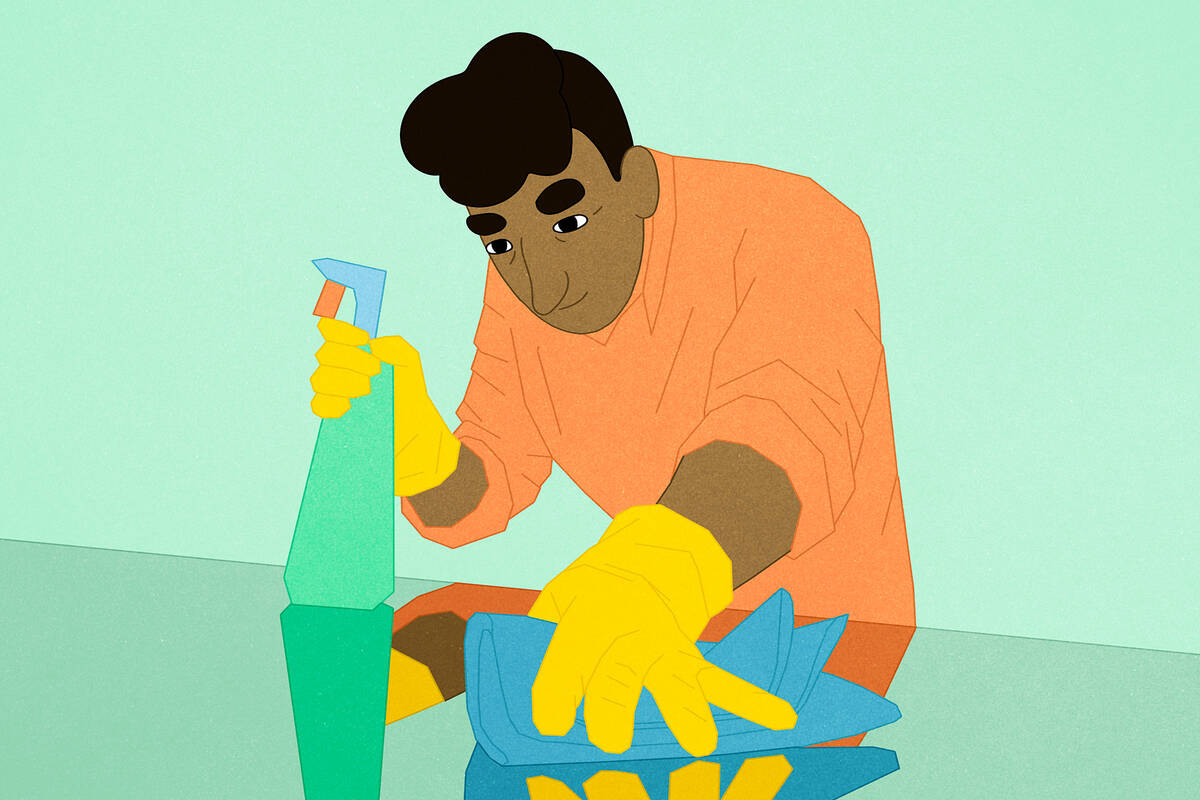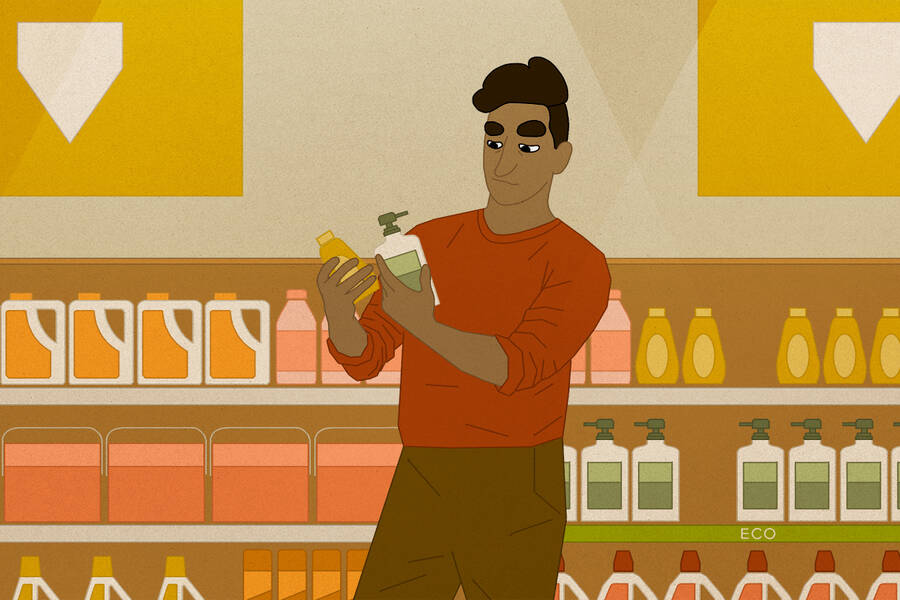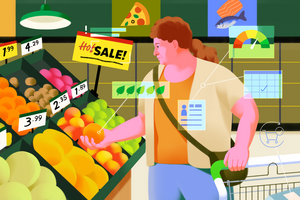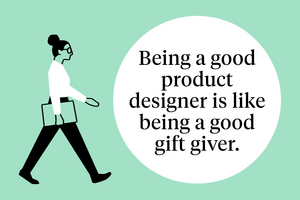Marketing Sep 1, 2025
Customers Are Taking a Shine to Eco-friendly Products
Sustainable alternatives were once viewed as inferior to their standard counterparts. But now, consumers equate “ecological” with “reliable,” easing industry fears.

Lisa Röper
At the supermarket, drugstore, and mall, eco-friendly options abound for everything from laundry detergents to toothpaste. Past research has suggested that people tend to believe these greener, more-sustainable alternatives aren’t as effective as traditional products—for instance, that dishwashing soap with “natural” ingredients will leave their plates less sparkly than “regular” soap.
This phenomenon is often called the “sustainability liability.” Since a company has to change certain features of its product to make it eco-friendly, the logic goes, the firm must have sacrificed performance. Because it sounds intuitive, “we tend to accept it without necessarily questioning it,” says Alexander Chernev, a professor of marketing at Kellogg.
But in a study, Chernev and his colleagues found that consumers may not be thinking this way after all. His team surveyed people about their views on the likely effectiveness of traditional versus sustainable products—and found there wasn’t much difference between the two.
“The sustainability-liability intuition might not be as strong as one might have thought,” Chernev says.
That doesn’t mean that the effect is never present, but it doesn’t seem large enough to meaningfully affect companies’ performance or warrant influencing their decisions. The finding might assuage managers’ concerns about investing in eco-friendly technology.
Chernev can only speculate as to why consumers no longer see sustainability as a detriment to product quality (if they did in the first place), but one possible reason is that eco-friendly products have simply gotten better over time. As people have tried them and been pleasantly surprised, they might think, “maybe this green stuff is not that bad,” he says.
An unexpected turn
Chernev started wondering about this question in earlier research when he and Sean Blair, a Kellogg PhD graduate now at Georgetown University, explored whether telling customers about a firm’s dedication to environmental protection could help reduce the sustainability-liability effect.
In the process of conducting the experiments, the researchers had trouble establishing the baseline—showing that participants believed green products performed worse. “We assumed it would be very easy,” Chernev says. But “we could not replicate that.”
So they decided to conduct a follow-up study to look for the effect, collaborating with Ulf Böckenholt, a professor of marketing at Kellogg, and Himanshu Mishra at the University of Utah. Generally speaking, it’s difficult for researchers to prove the absence of an effect. Instead, they can assess whether the effect is large enough to be meaningful.
“Is it managerially relevant?” Chernev asks. “Does it really matter?” After all, an effect could exist and still be too small to make a real difference.
How good is that dish soap?
On the online platform Prolific Academic, the researchers presented 3,342 participants with scenarios and questions about 10 types of hypothetical products, including mouthwash, all-purpose cleaners, hand sanitizer, and a set of car tires.
For each type of product, one group of people received information suggesting that the product was designed to be eco-friendly. The other group received a product description that didn’t include sustainability among its features. For example, in the description of an all-purpose cleaner, one group read that it was “formulated to be environmentally friendly,” and the other group read that it was “formulated in a way that is very similar to other all-purpose cleaners available in stores.” Participants then rated, on a 7-point scale, various attributes related to the product’s effectiveness.
“The sustainability-liability intuition might not be as strong as one might have thought.”
—
Alexander Chernev
On average, the performance rating for standard products was nearly identical to that for eco-friendly products. In other words, the sustainability-liability effect was negligible. The only category of eco-friendly products that received a lower performance rating was drain cleaner.
A follow-up analysis indicated that any potential sustainability-liability effect is more likely to appear when consumers place high value on a product’s strength. For example, consumers usually prefer a face cream to be gentle, which can make an eco-friendly version more appealing. In contrast, when choosing a product designed to remove tough stains, they may be more inclined to select a traditional option.
An extreme scenario
But even in situations where strength would seem to be paramount, sustainability wasn’t necessarily a detriment.
In the midst of the team’s research, the COVID-19 pandemic hit. People were scouring store shelves for hand sanitizer and other pathogen-fighting products. If there was ever a time when consumers really cared about functionality, this was it. Would the sustainability-liability effect be stronger, the team wondered?
To find out, the researchers ran a similar online study with 3,292 people, focusing on hand sanitizers, all-purpose cleaners, and dish soap. And they spread the experiments over three time periods, in April, August, and October 2020.
When the team analyzed the perceived performance difference between standard and eco-friendly products, “again, there was virtually no difference,” Chernev says, confirming that the effect “still didn’t show up.”
Consumers’ attitudes evolve over time
Finally, the team investigated how people’s thinking about sustainable products changed over time. They analyzed two existing datasets: the Google News corpus, which includes articles published up to 2013, encompassing 100 billion tokens, and a second dataset comprising all English-language Wikipedia text as of 2021, with its more than 2.7 billion tokens covering a wide range of topics.
The team found that words related to sustainability, such as “ecological” and “recycled,” were more closely associated with terms that suggest positive performance, like “efficient” and “reliable,” than with those that imply negative performance, such as “fragile” or “ineffective.”
More important, Chernev notes, is that the link between sustainability and positive performance was stronger in the more-recent Wikipedia dataset than it was in the older Google News dataset. While this wasn’t definitive evidence that people’s views about eco-friendly products had become more positive over time, it was consistent with the results of the online experiments.
Eco-friendly for all
Understanding the nuances of the sustainability-liability effect is important because it can shape consumer buying behavior—a critical step in tackling climate change, Chernev explains. The concern that consumers might see eco-friendly products as lacking in performance may have held some companies back from fully adopting sustainable technologies.
However, if sustainability is no longer seen as a liability, companies that were previously hesitant to develop green products may no longer need to worry about rejection from mainstream customers.
While individual purchasing decisions might not seem significant, customers’ choices ultimately shape corporate actions. “This is what drives companies’ behavior,” Chernev says.
Roberta Kwok is a freelance science writer in Kirkland, Washington.
Chernev, Alexander, Sean Blair, Ulf Böckenholt, and Himanshu Mishra. 2024. “Is Sustainability a Liability? Green Marketing and Consumer Beliefs About Eco-Friendly Products.” Journal of Public Policy & Marketing.



